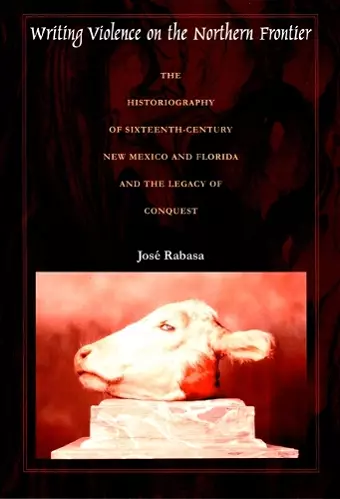Writing Violence on the Northern Frontier
The Historiography of Sixteenth-Century New Mexico and Florida and the Legacy of Conquest
Format:Hardback
Publisher:Duke University Press
Currently unavailable, and unfortunately no date known when it will be back

Explores the representations of violence in colonial Nuevo Mexico as seen in history and fiction literature of the period.
Examines the conjunction between writing and violence that defined the sixteenth-century Spanish conquest of the Americas (particularly North America) and in doing so, reveals why this conjunction remains relevant and influential today.In Writing Violence on the Northern Frontier José Rabasa examines the conjunction between writing and violence that defined the sixteenth-century Spanish conquest of the Americas (particularly North America) and in doing so, he reveals why this conjunction remains relevent and influential today. Rabasa elaborates a critique of Spanish legislation that prescribed forms of converting Indians to Christianity and subjecting them to Spanish rule, which was referred to by some as “peaceful conquest.” He argues that the oxymoronic nature of this term demands an oppositional mode of inquiry based on an understanding of violence that expands beyond acts of war to include symbolism, interpretation, legislation, and other speech acts that he refers to as the “force of law.”
To advance his argument Rabasa analyzes visual and verbal representations, colonialist programs, and the theories of colonization that informed the historiography of sixteenth-century New Mexico and Florida, which includes the territory from the Pacific coast to Kansas, and from present-day Florida to Tennessee and Arkansas. Using little-known materials from the northern borderlands of Spanish imperial expansion, Rabasa works to complicate notions of violence and their relationship to writing. Understood in juxtaposition with modern texts on postcolonial theory, his description of the dual function of these colonial texts—to represent material acts of violence and to act as violence itself—also emphasizes the lingering effects of this phenomenon in contemporary intellectual work and everyday life. In this way Writing Violence on the Northern Frontier serves not only as an explanation of what colonialist texts do but also instigates new ways of thinking about colonial discourse.
This book will interest scholars of colonial studies and early North American history, as well as a broader audience interested in interdisciplinary perspectives on the topic of racial, ethnic, and literary violences.
“Rabasa covers a rich range of topics that offer stimulating new insights into violence as a cultural and ideological element in the formation of colonial American societies.”— Maureen Ahern, Ohio State University
“Rabasa provides a compelling understanding of the cultural worlds of the Spanish conquerors as they collided violently with Native Americans in the contact zones--in Florida, California, Texas, Chile, and Argentina. In so doing he devastates the rationales underlying violence in sixteenth century Spanish history and fiction, and thus challenges the readers to reconsider the rationales by which English and American settlers inhabited the West, and which they called ‘frontier violence.’ ”—Patricia Seed, Rice University
“Rabasa uses a comparative approach that leads him to incorporate a fascinating and very diverse body of materials.”—Beatriz Pastor, Dartmouth College
ISBN: 9780822325352
Dimensions: unknown
Weight: 921g
376 pages